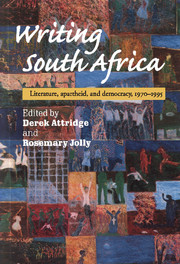Book contents
- Frontmatter
- Contents
- Contributors
- Acknowledgements and note on references
- South Africa, 1930–1996: a chronology
- Maps
- 1 Introduction
- 2 Interrogating silence: new possibilities faced by South African literature
- 3 I am dead: you cannot read: André Brink's On the Contrary
- 4 Endings and new beginning: South African fiction in transition
- 5 The post-apartheid sublime: rediscovering the extraordinary
- 6 Postmodernism and black writing in South Africa
- 7 Shame and identity: the case of the coloured in South Africa
- 8 A man's world: South African gay writing and the State of Emergency
- 9 The final safari: on nature, myth, and the literature of the Emergency
- 10 Interview
- 11 Speech and silence in the fictions of J.M.Coetzee
- 12 ‘Dialogue’ and ‘fulfilment’ in J.M. Coetzee's Age of Iron
- 13 Interview
- 14 Inside out: Jeremy Cronin's lyrical politics
- 15 Spinning out the present: narrative, gender, and the politics of South African theatre
- 16 South African theatre in the United States: the allure of the familiar and of the exotic
- Position papers
- 17 Preparing ourselves for freedom
- 18 Challenges facing theatre practitioners in the new South Africa
- 19 Current trends in Theatre for Development in South Africa
- Select bibliography: South African literary writing in English, 1970–1995
- Index
18 - Challenges facing theatre practitioners in the new South Africa
Published online by Cambridge University Press: 05 July 2011
- Frontmatter
- Contents
- Contributors
- Acknowledgements and note on references
- South Africa, 1930–1996: a chronology
- Maps
- 1 Introduction
- 2 Interrogating silence: new possibilities faced by South African literature
- 3 I am dead: you cannot read: André Brink's On the Contrary
- 4 Endings and new beginning: South African fiction in transition
- 5 The post-apartheid sublime: rediscovering the extraordinary
- 6 Postmodernism and black writing in South Africa
- 7 Shame and identity: the case of the coloured in South Africa
- 8 A man's world: South African gay writing and the State of Emergency
- 9 The final safari: on nature, myth, and the literature of the Emergency
- 10 Interview
- 11 Speech and silence in the fictions of J.M.Coetzee
- 12 ‘Dialogue’ and ‘fulfilment’ in J.M. Coetzee's Age of Iron
- 13 Interview
- 14 Inside out: Jeremy Cronin's lyrical politics
- 15 Spinning out the present: narrative, gender, and the politics of South African theatre
- 16 South African theatre in the United States: the allure of the familiar and of the exotic
- Position papers
- 17 Preparing ourselves for freedom
- 18 Challenges facing theatre practitioners in the new South Africa
- 19 Current trends in Theatre for Development in South Africa
- Select bibliography: South African literary writing in English, 1970–1995
- Index
Summary
For the purposes of this paper, it is important for the reader to bear in mind that it was written five years after Mandela's release from prison, and the start of the negotiations with the liberation movements, in 1990.
INTRODUCTION: PREMISE
It is globally known that the arts, especially theatre, have been one of the major features in the South African political struggle. From the 1970s, political theatre took a decidedly sharp critical view against apartheid. It was in the 1980s that the phenomenon of protest and resistance theatre performance was intensified within the country and exported to the international market.
This paper will focus on the way in which rhetoric in the arts was used to achieve power. I recognize that there have been some changes in other areas and that those changes are highly appreciated. Juxtaposed against the oppressed's expectation, those changes are too minuscule to warrant a celebration. I will show that while the liberation struggle recognized the role of the arts and culture, the developments since 1990 – especially since the 1994 elections – paint a different scenario in the politics of control. I will tease out questions in an attempt to elaborate on my convictions as one of the contributors to a theatre that has been and is always geared for change – a theatre that deals with consciousness – a theatre of resistance.
- Type
- Chapter
- Information
- Writing South AfricaLiterature, Apartheid, and Democracy, 1970–1995, pp. 249 - 256Publisher: Cambridge University PressPrint publication year: 1998
- 1
- Cited by



